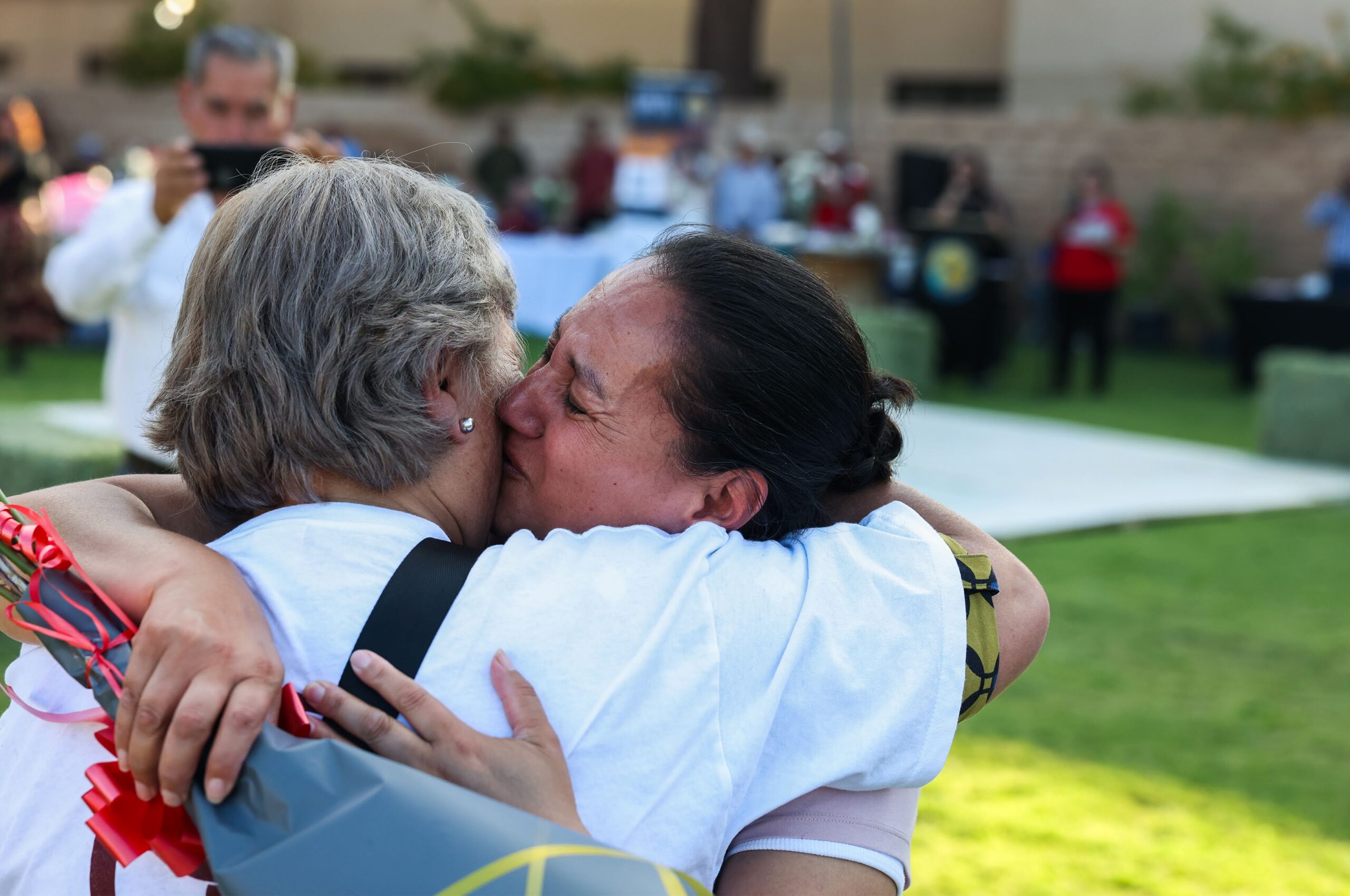After 16 years without seeing each other in person, Maria de Luz, who lives in Mexico, and her son, Baudelio, a Nevada resident, were finally reunited last Saturday evening at a ceremony in central Las Vegas.
As the two embraced, dozens of other reunified families watched while wistful music played in the background, many of them tearing up or even audibly sobbing at the scene.
“My emotions are indescribable,” de Luz, who is 66, said in Spanish.
De Luz was just one of the 25 parents reunited with their families this weekend through Corazón de Plata, a family reunification program created by the Federación de Zacatecanos, a cultural alliance made up of people from the Central Mexican state of Zactecas. As immigration policy becomes increasingly stringent and visas remain hard to come by, attendees at the event described Corazón de Plata — which translates to Heart of Silver — as a lifeline, allowing them to reconnect with family members they might have never seen otherwise.
It’s the first Las Vegas iteration of a program that began in 2011 in Chicago. Through an agreement with the Zacatecan government, local organizers with the Federación de Zacatecanos are able to streamline the tourist visa process for parents whose children are residing in the U.S and who have been unable to reunite with them for more than a decade.
In 2024 alone, the program arranged more than 800 tourist visas, from Fort Worth to Los Angeles.
To qualify, parents must be older than 60 and be from Zacetecas. Those approved for a visa then travel as a cohort on a free trip to the United States. The visa lets them stay for a month, but after returning home following their initial stay with their families, they are authorized to revisit the U.S. for a decade.
“One of the motivations is to let parents hug their children again,” Zaida Martinez, the head of Las Vegas’ Federación de Zacatecanos, said during an interview with The Nevada Independent. “There are so many people who haven’t been able to do that again.”
Recipients of Corazón de Plata have struggled to reconnect with family for a variety of reasons. Many have undocumented children who would not be permitted to return to the U.S. if they were to leave. Others simply could not afford the visit (applicants must prove steady income for a B1/B2 visa) or understand what they described as a complicated and time-consuming process. Martinez noted that many of the aging parents struggle with literacy, complicating the visa process even further.
Still, Martinez warns that simply applying for Corazón de Plata isn’t a guarantee of a visa and that it ultimately depends on immigration authorities to authorize one. This cycle, 10 visa applications out of 35 were rejected for Las Vegas’ Corazon de Plata program.

De Luz had her visa rejected twice by authorities until she finally secured one through Corazon de Plata this year. She had previously traveled from Zactecas to consulates in Monterrey and Guadalajara only to have her application rejected for what she felt were arbitrary reasons.
This time around, however, de Luz said the process was easy. “It wasn’t that hard with Zaida,” she remarked.
There have been cases in Corazón de Plata programs in other cities in which parents had become so overwhelmed by emotions that they had strokes or heart attacks after reuniting, Martinez said.
“We’ve seen it happen that they get so excited — because they are going to see their children — that they die,” she said. “Sometimes, also, because they don’t get the visas, they think they did something wrong and they get depressed. So this program means a lot.”
Griselda Rosales, 42, traveled from Utah to Las Vegas for the Corazon de Plata program. Rosales, who hadn’t seen her parents in more than 25 years, had heard of Corazon de Plata before, but the reunification events were always located in cities that were too far from her.
Her mother had previously applied for a visa during the pandemic, but her application was rejected.
“We heard about it on the radio, and I decided to put up a fight to go visit my kids,” Rosales’ mother, 67-year-old Eustrebertha Garcia, said in Spanish.
Rosales and her mother weren’t the only ones to take the trek. Other attendees at the Saturday ceremony traveled from California and Colorado to pick up their parents, many driving for more than five hours that morning with plans to head back that same evening.
Martinez said the Corazón de Plata program takes on a new, added significance with both presidential candidates promising to crack down on immigration. Former President Donald Trump has proposed launching a mass deportation campaign if elected, while Vice President Kamala Harris said she will take a “pragmatic approach” and will push the U.S. Senate to pass a bill that would stop processing asylum claims if encounters between authorities and unauthorized migrants reached a certain threshold.
“Whether it’s Donald Trump or Kamala Harris, if they want to come after the peace of our community, they are a danger to us,” Martinez said.
But outside of this interview, there was no discernable mention of the elections at the Saturday event. Representatives from the offices of Sen. Catherine Cortez Masto (D-NV) and Rep. Dina Titus (D-NV 1) watched silently as parents hugged and festivities took place. The sun began to set as mariachis strummed their guitars.
“It’s been so many years. I’m just so happy to be here,” Garcia said.

